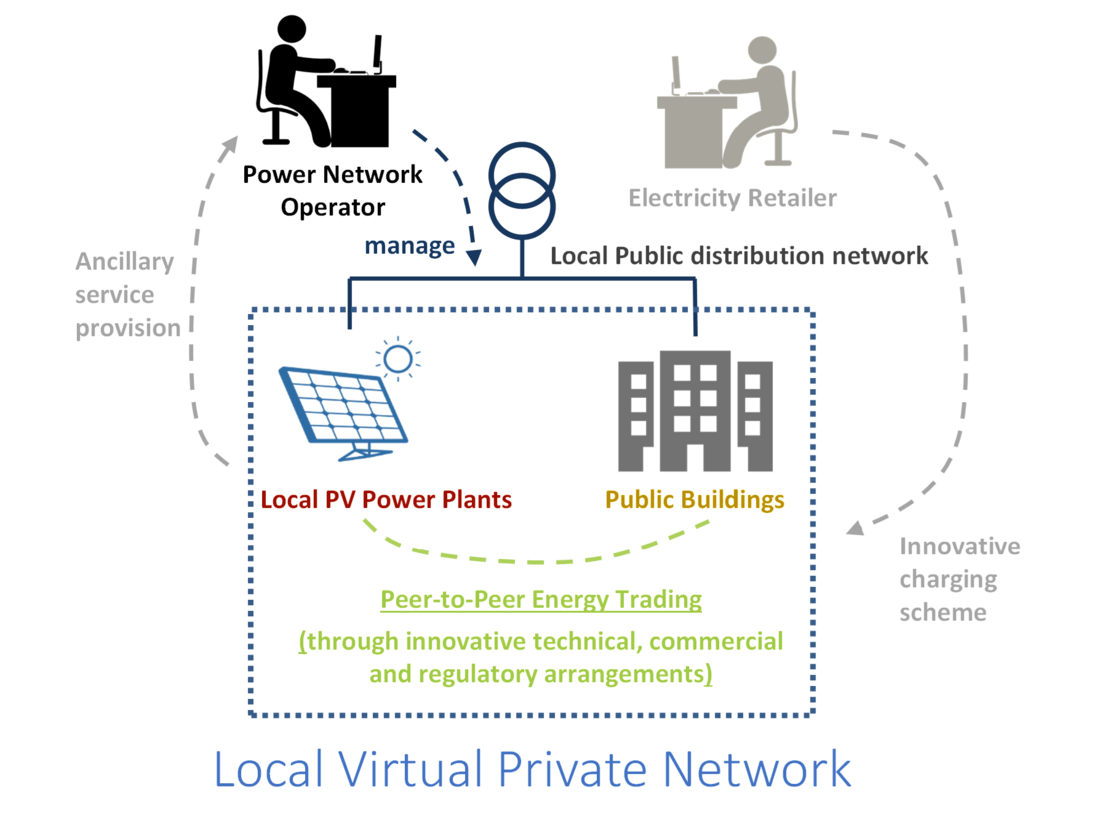Practical Considerations for Peer-to-Peer Energy Trading via Public Power Networks
Peer-to-peer (P2P) energy trading is an emerging electricity supply paradigm for integrating and utilizing a high penetration of distributed energy resources (DERs) in electric power systems. In P2P energy trading, prosumers and consumers trade and share energy with each other for mutual benefits as well as benefiting bulk power systems. Based on the experience of the “Local Virtual Private Network” project in Flintshire, Wales, UK, practical considerations for deploying P2P energy trading through public power networks are presented. Three major potential revenue streams are identified and analyzed, including reduced wholesale costs, reduced network costs and additional revenue from ancillary service provision. A comprehensive scheme consisting of technical solutions, commercial arrangements and regulatory reform is needed for deploying P2P energy trading in practice and reaping the value from all the streams.
By Dr. Yue Zhou and Prof. Jianzhong Wu
School of Engineering, Cardiff University, UK
What is P2P Energy Trading?
During the low carbon transition of electric power systems, there have been a rapidly increasing penetration of distributed energy resources (DERs) such as rooftop PV panels, small wind turbines, batteries, electric vehicles, and heat pumps. Traditional passive consumers are becoming active prosumers with DERs, which have the capability to produce, store and consume electricity flexibly. Traditional schemes for integrating DERs, such as “Net Metering” and “Feed-in Tariff”, have been increasingly not sustainable and ineffective to deal with the challenges or incentivize the flexibility of a high penetration of DERs.
In this context, peer-to-peer (P2P) energy trading has been proposed in recent years, where prosumers and consumers trade and share electricity with each other [1]. This contrasts with the traditional retail electricity market where prosumers and consumers separately trade with the electricity retailers. In P2P energy trading, the behaviors of prosumers and consumers will be adjusted according to the relationship between local electricity supply and demand, thus facilitating a local power and energy balancing [2]. As a result, a triple win situation is created, where prosumers sell their surplus electricity at a higher price, consumers buy electricity at a lower price, and power system operators operate power systems more efficiently and have the network reinforcement deferred. P2P energy trading has developed very fast in recent years globally in various aspects [3].
Deploying P2P Energy Trading via Public Power Networks
P2P energy trading can be conducted within various geographical scales, from national level (e.g. nationwide matching of power sources and demands) down to local level (e.g. in a residential community). The electricity supply agreed in P2P energy trading can be physically delivered through public power networks (transmission network, distribution network or microgrid, depending on the scale of P2P energy trading) or private wires/networks between prosumers and consumers.
While the scheme for P2P energy trading through private wires/networks is relatively clear, because it is in nature a “behind-the-meter” solution, P2P energy trading through public power networks still faces significant regulatory and commercial barriers. As a result, there has been very little successful large-scale commercial deployment of P2P energy trading via public power networks in practice [4].
In this context, we have been conducting a “Local Virtual Private Network” project in Flintshire, Wales, UK. In the project, a comprehensive set of technological, commercial and regulatory arrangements have been proposed for virtually linking and enabling P2P energy trading between small PV power plants and nearby public buildings, which are connected to a local public distribution network, as illustrated in Figure 1. The findings of this project will be presented for discussing the practical considerations for deploying P2P energy trading via public power networks.

Figure 1 – The Local Virtual Private Network development in Flintshire, Wales, UK
Potential Revenue Streams of P2P Energy Trading
P2P energy trading can bring technological, social and environmental values, but financial benefits are the primary value recognized by customers. Therefore, when planning to deploy P2P energy trading in Flintshire, three streams of financial benefits have been identified and analyzed.
Reduced wholesale costs
In the current electricity market paradigm, retailers first purchase electricity from the wholesale market through bilateral contracts or on-exchange trades and from distributed generators through Power Purchase Agreements (PPAs), and then re-sell the electricity to consumers based on an average price (i.e. socializing the overall costs). This part of costs is directly related to the electricity itself, and is called as “wholesale costs”, accounting for 34% of a consumer’s electricity bill in Great Britain (GB).
By contrast, in P2P energy trading, one-to-one trading relationship is established between local electricity sellers and buyers. As a result, the electricity price is decided between the sellers and buyers, without being affected by the electricity mix and pricing strategies of traditional retailers. This might lead to lower costs for consumers, if their electricity comes from renewable distributed generators which have almost zero marginal generation costs. This might also lead to higher revenue for distributed generators, considering that big retailers in the traditional electricity market usually have higher level of market power than small consumers in P2P energy trading.
Furthermore, it is inevitable that the actual electricity supply and demand will deviate from what have been agreed in the contracts, no matter in the traditional electricity market or in P2P energy trading. This deviation will be penalized in the “Balancing Mechanism” in GB. Traditional retailers socialize this imbalance cost among the consumers. In P2P energy trading, sellers and buyers can coordinate with each other to improve real-time local energy balancing, so that the imbalance cost may be reduced.
Reduced network costs
Another major component of electricity bills is “network costs” for compensating the use and reinforcement of electric power networks. This is called “use of system (UoS)” charges in GB, accounting for 22% of a consumer’s electricity bill. We argue that participants of P2P energy trading should receive reduced network costs due to less utilization and deferral of reinforcement of power networks.
First, for P2P energy trading between distributed generators and consumers in a local area, only a portion of distribution networks are used, in contrast to consumers buying electricity from faraway large generators all the way through various voltage levels of transmission and distribution networks. Therefore, network costs should be reduced proportionally to reflect reduced network utilization in P2P energy trading.
Second, P2P energy trading facilitates local power balance, potentially resulting in reduced peak power within a local area. Reinforcement of power networks is driven by the peak power, and thus P2P energy trading is able to defer network reinforcement if the P2P scheme is designed properly. This contribution should be considered in the network charging for P2P energy trading.
Additional revenue from ancillary service provision
With appropriate design, P2P energy trading can be used as an effective way to organize and manage DERs to provide ancillary service provision. This vision has been preliminarily demonstrated with a general generation/load increase/reduction service from a P2P energy trading coalition [5].
There are many potential opportunities with developed ancillary service markets in GB. National Grid Electricity System Operator (the transmission system operator in GB) purchases 15 types of balancing services, and Distribution Network Operators (DNOs) are trialing a wide range of flexibility services for congestion management and voltage control. Combining ancillary service provision will bring additional revenue for P2P energy trading.
Comprehensive Schemes for Deploying P2P Energy Trading
In order to deploy P2P energy trading via public power networks to reap all the streams of financial benefits, comprehensive schemes consisting of technical solutions, commercial arrangements and regulatory reform is needed. Coordination between prosumers and consumers is essential for P2P energy trading, and thus measurement, information and communication infrastructure, advanced data analytics, optimization and control techniques are needed. Innovative commercial arrangements are also needed to transform the value streams of P2P energy trading to real financial benefits of the participating prosumers and consumers. For example, a new “multi-party” PPA can be established between prosumers and consumers with more frequent negotiation (e.g. day-ahead) and finer time resolution for settlement (e.g. half-hourly). Regulatory arrangements also need systematic reform to cover a wide range of aspects, such as the licensing of prosumers and P2P energy trading coordinators and allocation of network costs, taxes and levies.
The comprehensive schemes for deploying P2P energy trading are summarized in Figure 2.

Figure 2 - Comprehensive schemes for deploying P2P energy trading in practice
Thumbnail credit: Eduard Muzhevskyi on iStock
- [1] C. Zhang, J. Wu, Y. Zhou, M. Cheng and C. Long, “Peer-to-peer energy trading in a microgrid,” Applied Energy, vol. 220, pp. 1-12, Jun. 2018.
- [2] Y. Zhou, J. Wu and C. Long, “Evaluation of peer-to-peer energy sharing mechanisms based on a multiagent simulation framework,” Applied Energy, vol. .222, pp. 993-1022, Jul. 2018.
- [3] Y. Zhou, J. Wu, C. Long and W. Ming, “State-of-the-art analysis and perspectives for peer-to-peer energy trading,” Engineering, vol. 6, no. 7, pp. 739-753, Jul. 2020.
- [4] Y. Zhou, J. Wu, C. Long and W. Ming, “State-of-the-art analysis and perspectives for peer-to-peer energy trading,” Engineering, vol. 6, no. 7, pp. 739-753, Jul. 2020.
- [5] Y. Zhou, J. Wu, G. Song and C. Long, “Framework design and optimal bidding strategy for ancillary service provision from a peer-to-peer energy trading community,” Applied Energy, vol. 278, 115671, Nov. 2020.

